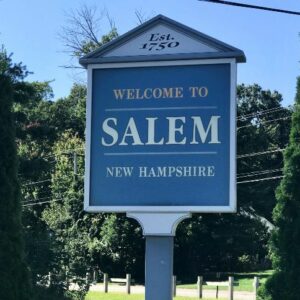Over the past two decades, Salem, N.H., has not only grown in population but has solidified itself as a Republican stronghold. With our population increasing from roughly 28,000 in 2000 to over 32,000 today, we’ve demonstrated how smart housing policies and a commitment to limited government can transform a community. Salem’s embrace of free-market principles has created more housing opportunities—and with it, more Republicans.
At the heart of this transformation is housing. Salem has recognized that the key to growth is allowing the free market to work. By being open to zoning reforms and reducing government-imposed barriers, we’ve enabled the private sector to build the homes our community needs.
The housing crisis affecting New Hampshire wasn’t caused by a lack of innovation or demand—it was caused by government overregulation. The solution isn’t more government; it’s less.
When local governments overregulate, they create artificial scarcity, driving up housing costs and pricing families out of the market. Salem has taken a different approach. By encouraging responsible zoning reforms and embracing free-market solutions, we’ve welcomed new residents who value low taxes, personal freedom, and limited government. When the government steps back and enables people to do more and be more, we all get to achieve more.
Despite Salem’s growth and pro-housing policies, the average home in town has become unattainable for many families just starting out. This is why we need to prioritize condominium projects, denser residential construction, and mixed-use zoning reforms in our existing commercial and industrial zones. By meeting market demand with new supply, we can ensure that Salem remains a welcoming community for families at all stages of life while continuing to support our local economy. And we can do it all—adding new housing stock for young people and families while preserving the character of our single-family neighborhoods.
Housing is not just about attracting those seeking liberty from high-tax states—it’s about ensuring that those who are from Salem can stay in Salem. In New Hampshire, communities like ours are spending an average of $20,000 or more per public school student each year. Over 13 years of public education, that represents a significant investment—one that stands to be lost if these students are forced to move out of their hometown to find affordable housing elsewhere.
I know this all too well. Hundreds of my fellow Salem High School Class of 2012 graduates have moved away from Salem, unable to find housing that fits their needs or budgets. That represents tens of millions of dollars invested in each grade of Salem students who are now contributing to other towns and states instead of our own. When we talk about housing, it’s not just for those moving here—it’s about ensuring that our students, our families, and our community members can remain a part of the Salem we love.
Denser, taller developments, like the successful developments we’ve already seen in Salem, are the key to building a housing stock that can accommodate Salem students when they reach adulthood. By encouraging these types of developments en masse across Salem’s current industrial and commercial zones, we can, through free-market forces, create affordable homes that families can own and grow into, ensuring that Salem remains a vibrant and thriving community.
Some have raised concerns that increased housing will change our community. The reality is that the majority of transplants to Salem from Massachusetts, Connecticut, and New York haven’t diluted our values—they’ve strengthened them. These newcomers are leaving high-tax, overregulated states because they believe in what New Hampshire stands for: low taxes, personal responsibility, and local control. In Salem, they’ve found a place that aligns with their beliefs, and their support at the ballot box has helped solidify our town as a Republican stronghold.
This growth has translated directly into political results. In the 2000 presidential election, Salem’s Republican vote percentage was 47.75 percent, nearly identical to the state’s 48.07 percent. But by 2024, Salem delivered a 59.3 percent vote for Donald Trump—11.2 percentage points higher than New Hampshire’s overall Republican vote share of 48.1 percent. Over the years, Salem has consistently widened this gap. For example:
– In 2004, Salem’s Republican vote was 54.3 percent, compared to the state’s 48.87 percent (+5.43).
– By 2012, Salem’s Republican vote was 57.3 percent, exceeding the state’s 46.4 percent by 10.9 percentage points.
– By 2024, Salem voted 59.3 percent Republican, a full 11.2 percentage points ahead of the state average.
These numbers reflect how Salem’s embrace of free-market principles has led to both economic and political success. More homes mean more neighbors who align with our values, strengthening our community and reinforcing Salem’s leadership in the Granite State.
The path forward is clear: we must continue to support zoning reforms that allow the free market to address the housing crisis. This isn’t just about housing—it’s about ensuring that Salem remains a place where families can thrive, businesses can grow, and Republican principles can flourish.
As chairman of the Salem Town Council and a state representative, I’m committed to ensuring that our policies reflect the needs of our community while staying true to the values that make Salem great. Together, we can build a brighter, freer, and more prosperous future for Salem.




